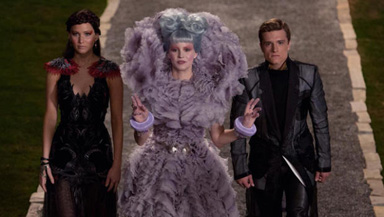The 400-Word Review: Catching Fire
By Sean Collier
November 25, 2013
BoxOfficeProphets.com

Unfortunately, off-the-mark direction from Gary Ross nearly sank the ship. Ross was justly given the boot (or left willingly, depending on who you believe) after the first film; in Catching Fire, he’s replaced by Francis Lawrence (I Am Legend). Considering how drastic the improvement between the two films is, it’s a shame Lawrence can’t remake the first flick.
We pick up with Katniss (Lawrence) and Peeta (Hutcherson) preparing for their duties as reigning Games winners, a few months removed from the first film’s climax. Katniss doesn’t get that she’s going to need to keep up the ruse indefinitely or risk drawing the ire of the powers that be; Peeta is having trouble accepting that Katniss’s affection for him was a ploy for mass consumption and not reality. Meanwhile, rebellion is fermenting just about everywhere under Katniss’ name, unbeknownst to her.
While the number of interested parties who haven’t yet had occasion to read the swift-moving books is likely small, I won’t spoil where Catching Fire is headed. But it’s worth noting that one of Collins’ brilliant moves in plotting out her trilogy was ensuring that the three books followed roughly the same structure: half bubbling tension and anticipation, half painstaking climax.
This is finely represented in Catching Fire, though the uninteresting love triangle between Katniss, Peeta and Gail (Hutcherson) is given too much time. Katniss is at her most conflicted and quarrelsome in Catching Fire, and Lawrence does a fine job with that challenge. Supporting performers like Harrelson, Banks and Stanley Tucci continue to shine, as do new additions Philip Seymour Hoffman, Jeffrey Wright and Jena Malone.
Given that the series’ final chapter, Mockingjay, is being divided into two films — thus obliterating Collins’ careful pacing — it stands to reason that Catching Fire may well stand as the best Hunger Games film. It’s a handsome, fearless representation of the book led by one of the cinema’s finest performers. If the whole trilogy were as strong as Catching Fire, it’d be one of the best ever.
Sean Collier is the Associate Editor of Pittsburgh Magazine and a member of the Broadcast Film Critics Association. Read more from Sean at pittsburghmagazine.com/afterdark